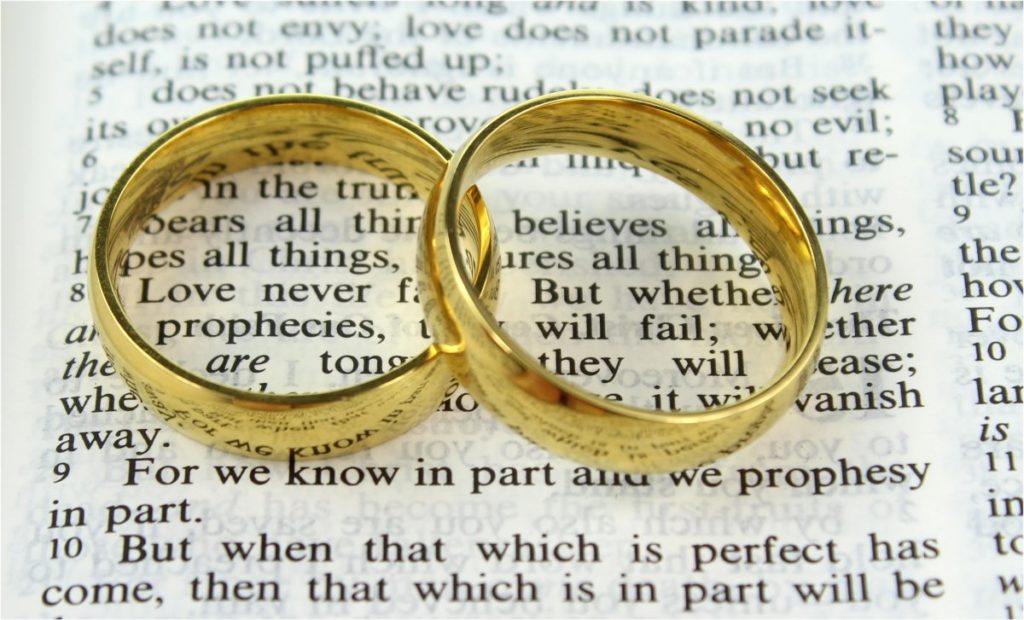Just recently, my local church hosted a one-night marriage summit. Anyone from the community was welcomed to attend. The idea was to spend a Friday date night with our spouses to invest in our marriages by hearing from a wide range of other couples, all from a Christian worldview.
The church provided child care, and a lovely Italian meal before a panel discussion delved into topics of money, communication, and parenting–all universal benefits and challenges within marriage.
My husband, Eric, and I were invited to join the panel to lay the Biblical foundations of marriage. Not as experts, by no means. We are approaching two and a half years of marriage. There is much for us to learn. But as we studied in preparation for this marriage event, there were insights we both discovered that I’d like to share here.
Man indeed has defined marriage according to our own terms. Which is why we see marriage determined by our opinions on gender and sexuality, marriage for convenience, divorce because we’re bored, and websites that have profited from selling affairs to married people. So much of our world’s approach to marriage is concerned with how it affects “me,” “my truth,” and “my desires.”
The result of a fallen authority on marriage is a lot of broken trust and pain. Broken adults. Broken homes. Broken children. And the cycle begins again.
Those raised in Christian households still benefit from the reminder that God established marriage as a gift with a beautiful purpose that the world’s definitions can never quite replicate. So critical is God’s establishment of a covenant union between man and woman, it’s outlined in detail within the Creation story: “Therefore a man shall leave his father and his mother and hold fast to his wife, and they shall become flesh.” (See Genesis 2:18-25 for full text)
Not only does God’s establishment of marriage provide partnership, intimacy, and stability and security for our children, our covenant unions are also a witness to Christ’s love for His people. This last point isn’t considered enough among Eric and I and the young couples we know, to be honest.
Ephesians 5:22-32 tells us that husbands are called to “love your wives as Christ loved the church and gave himself up for her” and “Now as the church submits to Christ, so also wives should submit in everything to their husbands.” The Apostle Paul, inspired by the Holy Spirit, writes that “this mystery is profound, and I am saying that it refers to Christ and the church.”
I confess that I felt a pang of humiliation as I considered how often I neglect to remember how my love for my Eric is meant to display Jesus Christ and what He has done and continues to do for the Church. My daughter is always watching my marriage’s Christian witness. Unsaved family members and even strangers in the grocery store are watching. How are my– our–actions and words towards our spouses portraying Christ to a broken world?
Living in a self-centered culture makes it tempting to obsess over how our marriages affect our feelings and desires. Emotions and a need to feel sparks and butterflies regularly overshadow God’s purpose for marriage. Plus, there are wise spouses with good, healthy marriages who can testify that these emotions ebb and flow over time. If we rely on our own romantic emotions to direct our marriages, we will fail to love our spouses well.
I’ve written before that the best marriage advice I’ve received came from a pastor friend who encouraged, “Chelsen, don’t approach marriage as a 50/50 partnership. Instead, approach marriage with a willingness to give 100 percent, no matter if Eric is giving a 100 percent or two percent that day.”
My pastor friend explained that we love our spouses well when we love and submit even when we don’t think our spouses have acted in a worthy way. Why? Because Christ gave His all–paid it all–for our sake though we did nothing to deserve His goodness and mercy. In the same way, we are called to love our spouses.
Ultimately, marriage is about something bigger than me as a wife or Eric as a husband. Our union reflects something so much bigger, more hopeful than him or me.
Perhaps you think this is nothing new. You’re right. It isn’t new. But it was convicting for me and, hopefully, for those wives or husbands at my local church on Friday night struggling to put themselves aside and love their spouses well.
Praise God for His saving grace.





Comment by Chuck Allers on March 19, 2018 at 7:11 pm
Great stuff. Marriage in God’s eyes is covenant – an agreement based solidly upon the interest of the other. Contract, in contrast, is an agreement based solely upon the interest of the self.